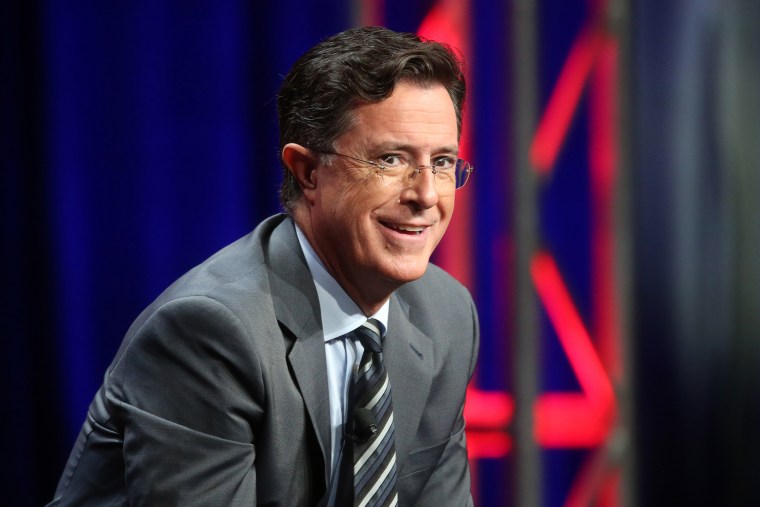"Late Show" host Stephen Colbert's clash with former Secretary of Defense Donald Rumsfeld on his CBS show on Monday was anything but a laughing matter.
Colbert, who infamously played a parody of hawkish conservatives for years, took Rumsfeld to task for his role in the build-up to and execution of the war in Iraq. Recalling Rumseld's widely criticized 2002 press briefing remarks about "known knowns, known unknowns, and unknown unknowns,” Colbert argued that there are some things that are "unknown knowns, which are the things that we know and then we chose not to know them or not let other people know we know." A deadly serious Colbert then brought up as an example of that a declassified September 2002 memo that acknowledged the WMD analysis was flawed.
"We were presented a partial picture ... do you think that was the right thing to do?" Colbert asked Rumsfeld, who was appearing on the show to ostensibly promote a new app he helped create, which fuses Solitaire with a game invented decades ago by the legendary late British prime minister Winston Churchill.
RELATED: Trump rejects birther question from Colbert on 'Late Show'
Rumsfeld demurred with a remark alluding to Democratic front-runner Hillary Clinton's email scandal ("I don't put classified things on my website") and a long-winded defense of then President George W. Bush's actions coupled with an acknowledgment that intelligence gathering is an imprecise science.
"If it were a fact, it wouldn't be called intelligence," Rumsfeld said, drawing uncomfortable laughs from the studio audience.
“Wow,” Colbert quipped. “I think you answered my question.”
Colbert's more substantive approach with the 83-year-old former official recalled his somewhat tense sit-down with GOP presidential candidate Sen. Ted Cruz last September. During that interview, he pushed back against Cruz's attempt to link his legacy to that of Ronald Reagan's. "Reagan raised taxes, OK. Reagan actually had an amnesty program for illegal immigrants. Neither of those things would allow Ronald Reagan to be nominated today," Colbert told Cruz.
The comedian's penchant for honest exchanges has endeared him to fans, but it may have alienated potential converts. Since his high-profile debut last September as a straight late night host — and no longer the signature conservative caricature for which he became famous — Colbert's ratings have declined. He now frequently finishes third in the crowded late night ratings race, after NBC's Jimmy Fallon and ABC's Jimmy Kimmel, and some reports have suggested that the cause may be largely due partisan perceptions.
According to a survey published last fall in The Hollywood Reporter, Colbert's audience is disproportionately composed of Democratic voters (47% to 17% Republican) while Kimmel and Fallon's audiences are evenly split between viewers from both parties. Although Colbert has made no secret about the fact that he is personally left-leaning, that hasn't stopped him for mercilessly skewering candidates from all sides of the political spectrum.
Of course Colbert has been on air only a few months and still has plenty of time to develop more memorable moments that could go viral. And his fans should take heed in an unlikely example: Former "Tonight Show" host Jay Leno, who trailed Colbert's predecessor David Letterman for a couple seasons before eventually dominating their ratings competition for nearly two decades.
